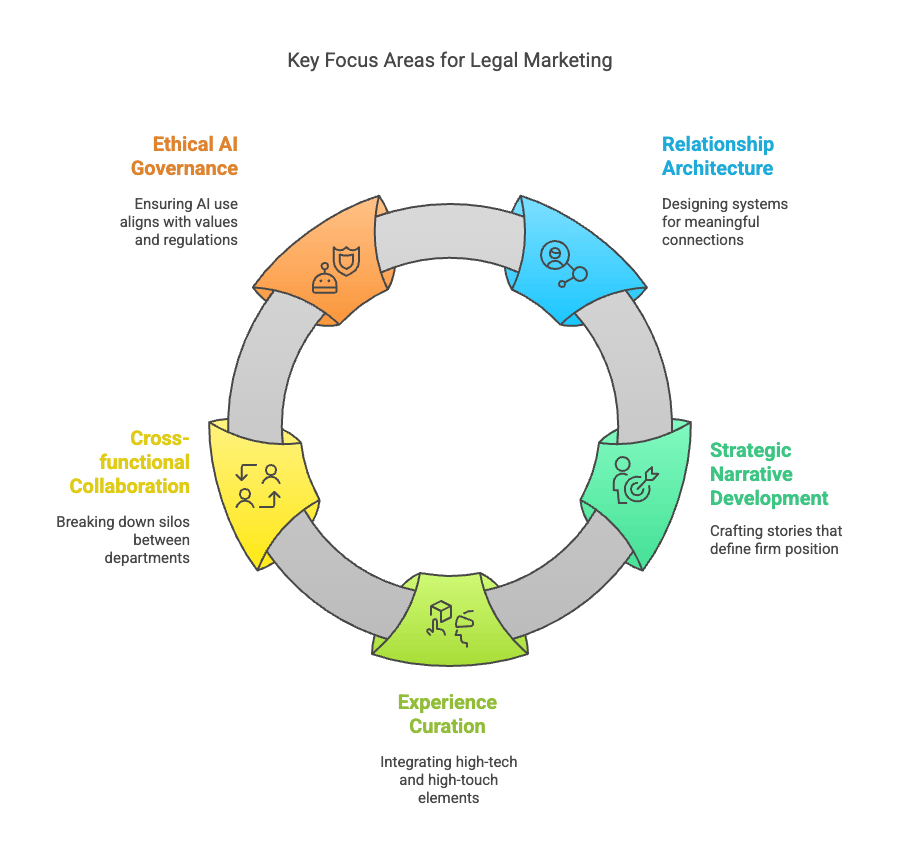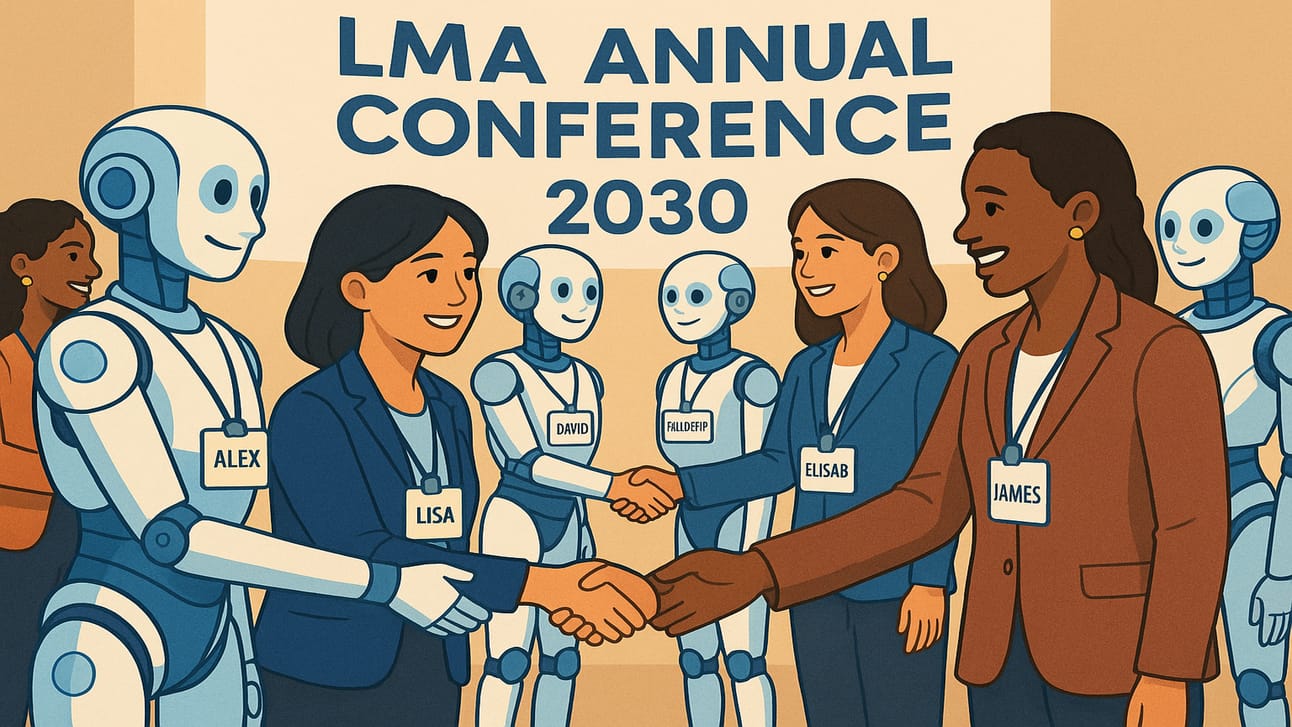What an incredible week it was at the 2024 LMA Annual Conference in Washington, D.C.! There's something magical about reconnecting with colleagues and making new connections in person that no virtual meeting can replace. The energy in the room was palpable as legal marketing professionals from across the country shared insights, celebrated successes, and tackled common challenges.
I was particularly impressed by the caliber of the sessions this year. The speakers were more engaging than I've seen in years past, offering practical insights rather than the theoretical concepts we sometimes get trapped in. The AI-focused sessions stood out especially, with thoughtful discussions about both implementation strategies and ethical considerations.
As I wandered through the packed exhibition hall, catching up with old friends and meeting new vendors, I couldn't help but wonder: What will this gathering look like in a few years? How many of the roles represented here will evolve—or perhaps disappear—as AI transforms our profession?
The Future of LMA: A Different Kind of Conference?
Between networking events and keynote speeches, I found myself contemplating a question that seems increasingly urgent: How will artificial intelligence reshape not just our day-to-day work, but the very composition of our profession?
The LMA conference has always been a reflection of the legal marketing industry itself—the mix of roles, the trending topics, the emerging technologies. If today's predictions about AI hold true, we might be looking at a very different gathering in the coming years.
I'm not suggesting the conference will disappear—far from it. But the roles represented, the skills showcased, and the conversations happening in the hallways may undergo a profound transformation as AI continues its march through our profession.
The Sam Altman Prediction That Keeps Me Up at Night
Last November, OpenAI CEO Sam Altman made a prediction that sent shockwaves through the marketing world. Speaking at an MIT AI conference, he stated that "70% of current marketing tasks will be automated by AI within the next 12-24 months." When a leader at the forefront of AI development makes such a bold claim, it deserves our attention.
And he's not alone. Paul Roetzer, founder and CEO of Marketing AI Institute and SmarterX, has long warned about this coming shift. For years, Roetzer predicted that "at least 80 percent of the things marketers do every day would be intelligently automated to some degree" within three to five years. Recently, he's revised that timeline downward to just two to three years—and even admits that might be conservative.
I've spent decades helping law firms navigate digital transformations—from the early days of websites to the social media revolution and now AI. Each wave brought concerns about obsolescence, but this one feels different. It's moving faster, reaching deeper, and transforming more fundamental aspects of our work.
Silicon Valley's Promise vs. Corporate Reality
Greg Shove, CEO of Section and co-author of the Personal Math newsletter, makes a sobering point about the gap between how AI is being sold and how it's being bought: "Silicon Valley is selling human augmentation with AI, but CEOs and CFOs are buying human replacement. Replacing humans with AI = much better margins for the business" .
This disconnect explains why the popular reassurance that "you won't lose your job to AI, you'll lose it to someone who uses AI" feels increasingly hollow. The truth is that for many marketing roles, particularly those focused on tactical execution, AI represents a fundamental threat rather than a complementary tool.
Shove challenges the comfortable notion that everyone's job is safe, noting that "the 'you won't lose your job to AI' line became popular because it quells our anxieties and strokes our egos ('Yes, some people will be affected … but not me.') But it won't protect us from what's coming. Layoffs ARE going to happen" .
The AI Exposure Gap in Legal Marketing
Recent forecasts from SmarterX's JobsGPT analysis reveal that marketing roles face varying levels of AI exposure:
Marketing Role | AI Exposure Rating | Key Vulnerable Tasks |
Social Media Specialists | 81% | Content generation, scheduling, basic analytics |
Content Writers | 76% | Draft creation, SEO optimization, formatting |
Digital Marketing Specialists | 69% | Campaign setup, basic analysis, reporting |
Marketing Assistants | 85% | Administrative tasks, data entry, basic research |
Market Research Analysts | 58% | Data gathering, preliminary analysis, report generation |
Marketing Directors | 42% | Strategic planning, relationship management, innovative thinking |
Brand Strategists | 39% | Brand positioning, storytelling, creative concept development |
As I wandered through the LMA exhibition hall, these statistics kept flashing in my mind. The roles with the highest exposure ratings align precisely with many of the tactical functions being showcased at the conference:
Social media content creation – AI already excels at generating posts, creating content calendars, and even selecting optimal posting times based on audience engagement patterns.
Award submissions – The meticulous process of gathering information, crafting compelling narratives, and formatting submissions according to specific requirements is increasingly automatable.
RFP responses – AI can now analyze previous successful proposals, extract relevant experience, and generate customized responses that once required days of coordinated effort.
Content marketing – From blog posts to client alerts, AI can draft, polish, and optimize content that once required significant human time and expertise.
Email marketing – From segmentation to personalization to A/B testing, AI is streamlining workflows that marketing teams once spent countless hours managing.
Let's be honest: if your primary value lies in executing these tactical activities, the ground beneath your feet is shifting dramatically.
Outcomes vs. Outputs: A New Way to Define Your Value
One of the most important insights from Shove's analysis is that "layoffs will happen first to people who define their worth in terms of their outputs, instead of the outcomes they create or contribute to" .
This distinction between outputs (the tangible work products you create) and outcomes (the business results your work ultimately drives) is crucial. AI excels at generating outputs—drafting blog posts, designing social media campaigns, optimizing email subject lines. But connecting those outputs to strategic business outcomes still requires human judgment and insight.
What Will Remain Distinctly Human
Despite these sobering realities, I left the conference with a sense of cautious optimism. Why? Because I observed something AI cannot replicate: deep, intuitive understanding of clients.
The best conversations I had at LMA weren't about tactics or tools—they were about relationship intelligence. Legal marketers who truly understand their firms' clients—their business challenges, industry pressures, and unspoken needs—possess something algorithms can't easily replicate.
Looking at the SmarterX data again, it's clear that roles focused on strategy, relationship building, and creative thinking have significantly lower AI exposure. This aligns with my observations about which areas will remain distinctly human domains:
Strategic client insight – Understanding what clients truly want versus what they say they want requires emotional intelligence and contextual knowledge built over years of relationship building.
Cross-practice collaboration – Identifying opportunities to connect clients with additional firm services requires nuanced understanding of both client needs and attorney capabilities.
Culturally aligned communication – Ensuring marketing efforts reflect a firm's unique culture and values requires a sensitivity that goes beyond data points.
Relationship cultivation – The human touch in building and maintaining client relationships remains invaluable, especially in a profession built on trust.
Creative problem-solving – Developing novel approaches to unique marketing challenges still requires the kind of lateral thinking humans excel at.
The Path Forward: From Tactical Executors to Strategic Advisors
For marketing professionals to remain relevant, we must evolve from tactical executors to strategic advisors. This transformation requires both mindset shifts and new capabilities.
Embracing AI Literacy
The divide in our profession won't be between humans and AI, but between marketing professionals who understand AI and those who don't. Those who develop AI literacy—who learn to collaborate with, direct, and expand upon AI's capabilities—will thrive in this new landscape.
This means developing skills in:
Prompt engineering
AI output evaluation and refinement
AI tool selection and integration
Strategic oversight of AI-human workflows
Elevating Your Focus
As AI handles more routine tasks, successful legal marketers will elevate their focus to areas machines cannot easily reach:
Relationship architecture – Designing systems and opportunities that foster meaningful human connections
Strategic narrative development – Crafting the overarching stories that define a firm's unique position
Experience curation – Designing client experiences that integrate both high-tech and high-touch elements
Cross-functional collaboration – Breaking down silos between marketing, business development, and practice groups
Ethical AI governance – Ensuring AI use aligns with firm values and regulatory requirements

Looking at where marketing professionals currently spend their time versus where they add the most value reveals a significant opportunity. According to various studies, most legal marketers spend 60-80% of their time on tactical execution and only 20-40% on strategic activities. AI allows us to flip this ratio, focusing human talent on high-value work.
Demonstrating Value Beyond Execution
Perhaps most importantly, marketing professionals must get better at articulating their strategic value to firm leadership. When partners understand your contribution goes far beyond tasks that can be automated, your position becomes more secure.
In conversations with managing partners, I've observed a clear pattern: they view marketing professionals who focus on strategic client insights as invaluable, while seeing those who primarily execute tactical activities as increasingly replaceable.
A Vision for the Legal Marketing Professional of Tomorrow
I believe the legal marketing professional of 2030 will look quite different from today's counterpart. Far from being replaced by AI, they will be empowered by it—freed from routine tasks to focus on higher-level strategy and relationship building.
This marketing professional:
Oversees a suite of AI tools that execute tactical activities with minimal human intervention
Maintains deep, nuanced understanding of the firm's clients and their evolving needs
Excels at translating client insights into strategic opportunities for attorneys
Serves as a trusted advisor to firm leadership on market positioning and differentiation
Continuously develops both technological fluency and emotional intelligence
McKinsey's research underscores this point. Their recent State of AI report found that a plurality of organizations (38%) predict that generative AI will have little effect on overall workforce size in the next three years. Instead, employees are most often spending time saved through automation on entirely new activities or devoting more time to existing responsibilities that haven't been automated.
Will Law Firm Leaders Recognize This Opportunity?
The greatest risk to legal marketing professionals isn't AI itself—it's law firm leadership that fails to recognize the strategic value marketing brings beyond tactical execution.
Some firms will see AI merely as a cost-cutting opportunity, using it to replace marketing staff rather than to elevate their contributions. These firms will likely find themselves at a competitive disadvantage, as they lose the strategic insights and relationship intelligence their former marketing professionals provided.
More visionary firms will recognize that AI creates an opportunity to transform their marketing function from a cost center to a value driver. By automating routine tasks, they'll enable their marketing teams to focus on work that directly impacts client relationships and firm growth.
A Call for Evolution, Not Fear
As I reflect on my time at the LMA conference, I feel both concern and hope for our profession. The landscape is undeniably changing, and some roles as they exist today will disappear.
But I firmly believe that with advanced AI literacy, most marketing and business development professionals at law firms will not only retain their positions but grow and progress in their careers. The key lies in embracing evolution rather than fearing elimination.
For today's legal marketers, the question isn't whether AI will take your job—it's whether you're prepared to evolve your role as AI transforms the tactical aspects of marketing. Those who embrace this transformation, developing both technological fluency and deeper strategic capabilities, will find themselves more valuable than ever in tomorrow's law firms.
What are you doing to prepare for this transformation? How are you balancing AI adoption with human-centered marketing approaches? I'd love to hear your thoughts and experiences in the comments.


